- Home
- Beryl Kingston
Off the Rails
Off the Rails Read online
Off the Rails
Beryl Kingston
Contents
Title Page
1
2
3
4
5
6
7
8
9
10
11
12
13
14
15
16
17
18
19
20
21
22
23
24
25
26
27
28
29
By the Same Author
Copyright
1
THE FARMHOUSE KITCHEN was seething with anger, reddened faces creased and twisted, mouths roaring, the flagstones loud with the stamp of furious boots, the air a storm of furious movement. The three littl’uns had retreated to the safe corner by the dresser the moment the row began and were crouched together on the long stool, keeping out of harm’s way, and the farm dogs were cowering too, in their case under the kitchen table, their ears laid back and their eyes upturned and watchful, ready to make a bolt for it if the fight got too hot.
‘How could you have been such a stupid, gormless fool?’ John Hudson shouted at his brother. ‘You beggar belief.’ At twenty-six he’d been head of the family for seven years, ever since his father died, and although there were times when the burden of running the farm and looking after nine brothers and sisters felt as heavy as a millstone, until that day he’d thought he was doing rather well. But this was beyond a joke. ‘You’re fifteen, for heaven’s sake, George. Fifteen. Old enough to know better. What were you thinking of?’
‘He weren’t thinking at all,’ brother Robert said, glaring at George but speaking to John. ‘He were drooling an’ rutting like some great fool ram wi’ the ewes. That’s what he were doing. He should have his breeches sewed up wi’ cobbler’s thread. That’ud stop him.’
‘What happened to the sixth commandment?’ brother William wanted to know. ‘Thou shalt not commit adultery. Remember? You’ll burn in hellfire, George. Think of that.’ He was the smallest and palest of the brothers and very aware of the need for obedience.
‘Since when has he ever obeyed anyone?’ Thomas said, sneering at his brother from his superior height. He was a strong, thick-set seventeen-year-old with a ready pair of fists. ‘He don’t know t’meanin’ of t’word. He thinks he may go his own way and damn the rest of us. Allus has. ’Tis what comes of being a spoilt brat. Ma’s dear little pet, what may do as he pleases and take what he wants an’ leave the rest of us to pay the piper.’ His mother’s blatant favouritism still rankled, even now, nine years after her death.
‘’Twere nobbut a farm gel,’ George said, standing his ground. Fifteen he might be and the fifth son, which wasn’t the best position to be in, especially when the other four were rounding on him and Tom looked ready to punch him in the face, but he squared up to them nevertheless. They needn’t think they could bully him. ‘She were willing. ’Tweren’t a matter of commandments. We were doing what were nat’rul. Same as anyone would. That’s all.’ Talking about it was opening his mind to memories, to the baked-bread smell of the harvest and the way they’d sung as they scythed, to the warmth of the sun on the back of his head as he pushed up her skirt, the tang of salt on her skin, the harshness of the straw scratching them as they rolled over and over together in the haystack, closer and closer. Oh, ’twere gradely. He couldn’t quite bring her name to mind but he could remember the smell of her as if she were still lying underneath him.
‘All!’ John said, throwing his hands in the air in exasperation. ‘All, he says! He gets a girl into trouble, he’s fined for bastardy – bastardy I ask you, in this family; Pa must be turning in his grave – and ’tis writ in Howsham Poor Book for all the world to see and he says all. Twelve an’ sixpence you’ve cost us, I hope tha knows. Twelve whole shillings and sixpence!’
‘I’ll pay it back,’ George said.
‘Aye, tha will. Every brass farthin’. I’ll make sure tha does.’
Their big sister Philadelphia was sitting at the kitchen table with her younger sister Ann beside her, both of them busy shelling peas into a cooking pot, with a pile of empty pods between them ready for the compost heap. Now she looked up at John in anxiety. ‘They won’t see it, though, will they?’ she said.
John looked distracted. ‘Who won’t see what?’ he said.
‘The neighbours,’ Philadelphia explained. ‘I mean to say, they won’t go looking in t’Poor Book, will they? An’ if they don’t look in t’Poor Book, they’ll not know, will they.’
‘In a place this size?’ John said. ‘Oh come, Philly. Think on it. Three farms and a handful of cottages wi’ a gossip in every which one of ’em. Course they’ll know. Everyone’ll know, if they don’t know already. It’ll only tek one to get wind of it an’ it’ll be round the village like wildfire.’
Philadelphia wiped the sweat from her forehead with her apron. ‘Oh, Georgie, Georgie,’ she said, wearily. ‘Look what tha’s done to us.’
‘It’s not a matter of what he’s done to us,’ Robert told her grimly. ‘It’s a matter of what we’re to do wi’ him. That’s the gist of it. What we’re to do wi’ him.’
‘Thrash him within an inch of his life,’ Tom said, flexing his fists. ‘That’ud show him.’
‘We’ll not take that road,’ John told him, asserting his authority. ‘I’ll not have fisticuffs. We’re not savages.’
‘Well, he can’t stay here an’ that’s flat,’ Robert said. ‘They’ll think we condone what he’s done if we let him stay here an’ I’ll not have that. I don’t condone it nor never will.’
Outside in the fields it was noonday and the ewes were calling their lambs into the shade, their bleating clear and tender in the summer air; green corn rippled like silk under the softest southwest breeze; the gnarled boughs of the apple tree beside the kitchen window were a-twitter with fledgling finches calling to be fed; farm horses cropped the grass in the long meadow while the labourers took their ease and their cheese beside the barn; and somebody was slowly pumping water in the garden of one of the nearby cottages, the pump handle squeaking in a steady rhythm as the water plashed into the wooden bucket. It was a gentle summer’s day and the life of the village was easy-running as a stream.
‘We can’t throw him out,’ Philadelphia said, returning to her peasecods. ‘He’s our brother when all’s said and done.’
‘We can’t do nowt,’ John told her. ‘Rob’s got the right of it. We can’t be seen to condone a lecher. We’ve a standing in this place, a name.’
George’s memories seeped away like water on soil. There was nothing for him now but the need to fight back and his own growing and desperate anger at the way they were treating him. If they thought he’d stay a minute longer in their stupid farmhouse listening to their hateful talk, they were very much mistaken. ‘There’s no need to throw me out,’ he said. ‘I’m going anyroad. I’d not stay if you paid me to. I’ll make shift somewhere else, don’t you worry. I’ll find myself a job wi’ good pay an’ I’ll make my fortune an’ damn the lot of you.’ And he turned away from their hateful, hating faces and headed for the kitchen door and the stairs.
‘Tha can’t leave now,’ Philadelphia protested. ‘Tha’s not had dinner.’
He turned, paused and faced her. ‘Dinner!’ he said with all the scorn he could muster. ‘I don’t want tha dinner. ’Twould choke me.’
‘Georgie, don’t!’ Philly said, holding out her hand towards him as if she were going to pull him back. ‘Tha must have s
ummat to eat.’ But he was already out of the door and bounding up the stairs.
‘Let him go,’ Thomas advised. ‘There’s nowt to keep him here.’
John looked round the room at his family and dusted his hands on his breeches. ‘Time we were back at work,’ he said.
Although he was clumsy with anger, it only took George Hudson a matter of minutes to scrabble his few belongings together and push them into a pillow case. Then, still in a fury, he knotted the ends together to make a bundle, tied them with a length of rope so that he could carry it on his back, stamped down the stairs and left the house. Once outside, he made sure he keept his head high, in case any of the neighbours were watching, and he didn’t look back. The farm had been his home since he was born but it was no home to him now.
It didn’t take him any time at all to walk through the village for there was so little of it, just a narrow path that wound uphill, with woods to his right and a cluster of small stone cottages to his left. His life here was over and done. Now he must head for a new life in the city of York. He had no idea what he would do when he got there but what of that? It was a ten-mile walk and something would occur to him before it was over. Hadn’t Ma always told him he could do anything if he put his mind to it. Very well then. He would put his mind to this and he’d get himself a job and work hard and make his fortune and one day he’d be rich and famous and they’d all have to eat their rotten stinking words and serve them right.
‘They’ve thrown him out then,’ Mother Hardcastle observed to her neighbour. The two women were out in the front gardens, sitting side by side in the sunshine, their chores temporarily forgotten. Mrs Hardcastle had been up all night birthing a baby in a neighbouring village and now she was weary and needed a rest.
‘Good job an’ all,’ her neighbour said. ‘That’s my opinion. Serve him right. Lecherous little varmint.’
‘Poor Jane,’ Mrs Hardcastle sighed. ‘What’ll become of her?’
‘She’ll make out,’ her neighbour said. ‘Her ma’ll take care of her. You’ll see. Bound to.’
‘Ruined for life,’ Mrs Hardcastle said, in her lugubrious way, scowling at George’s retreating back. ‘That’s the size of it. An’ that poor fatherless brat along with her. She’ll not find herself a husband now. Never in a thousand years. Ruined for life. Poor Jane.’ She gave an elaborate sigh. ‘Ah well,’ she said, ‘he’s gone now. Good riddance to bad rubbish, that’s what I say.’
Her neighbour sighed too. ‘I’d best be getting back indoors,’ she said. ‘I’ve a pudden to make and if I don’t start soon, I shall be all behind like the cow’s tail.’
It wouldn’t have surprised either of them to know that poor Jane was weeping. She sat in her familiar wooden chair in the dingy kitchen of her father’s tied cottage by the footpath to Scrayingham, with her feet on the earth floor, her hands folded protectively across her swollen belly, and cried with despair. Her face was blotchy with tears and long damp strands of her dark hair had tangled out of her cap. ‘I can’t bear it,’ she wept. ‘I can’t bear it.’
Her mother was bending over the fire stirring the stew. ‘That’s a fool thing to say,’ she said, giving the spoon a sharp tap against the side of the pot. ‘Tha’s a labourer’s child and tha’lt bear what tha has to. Tha should have thought a’ this when tha said yes to him in t’first place. There’s no earthly use a-cryin’ over spilt milk. What’s done is done. Aunt’ll take care of ’ee. Tha’s got tha things. Tha can write to us.’ It had been a matter of such pride that she’d taught her Janey to read and write. She’d thought it put her a cut above the others. And now look where they were. Minutes away from being parted and more unhappy than they’d ever been in their lives. She knew she was being too brusque with this poor child of hers but it was the only way she knew to avoid weeping herself.
Jane looked down at the ancient carpet bag that stood beside her chair and sobbed again. Her ‘things’ were few and limited: her old skirt and her mother’s old shawl, a brush and comb, a prayer book, a pad of writing paper and a quill pen, a parcel of baby clothes. But things were just things. What she wanted was her home. Small, impoverished and dingy as it was, it had been the only home she’d ever known, and now she had to leave it and go and live with an aunt she scarcely knew in a place she didn’t know at all and she wouldn’t see her mother again until Christmas. She couldn’t bear it.
Her mother put down the spoon and came to stand beside her. ‘It can’t be helped, Janey,’ she said, lifting the girl’s head and wiping her face with the corner of her apron the way she’d done so many times in the last fraught months. ‘You can’t keep the child here, you know that, poor little scrap. ’Twould be made mock of an’ spat at an’ called names an’ I don’t know what-all. Folk can be mighty cruel. You’d not like that, now would you? No. You’ll do well enough with Aunt Tot. She’ll not tell anyone. She’s given her word. You’ve got a wedding ring to show to folks. You know what to say. You’re a sailor’s wife an’ his name’s John Smith an’ he’s been lost at sea. They’ll not press you for more than that.’
Jane made one last useless plea. ‘Let me stay, Ma,’ she begged. ‘One more night. Just one. I’ll go tomorrow, good as gold. I promise.’
‘The cart’s coming tonight,’ her mother said, turning away from her. ‘Soon as it’s dark. It’s no earthly use weeping. ’Tis arranged. Now dry those eyes like a good girl an’ help me peel these tatties or we shall have no supper for your father.’
Peeling potatoes was no comfort to Jane Jerdon at all. It just reminded her that this would be her last meal at home. But it was a chore and she had to do as she was told. And when the meal had been eaten and she heard the cart trundling up to the door, she had to obey that too. She listened as the carter eased his horse to a halt, calling ‘Whoa my sonny’ the way he always did, and then her father went out to greet him, and the moment had come. She picked up her bag, kissed her mother and drooped after him. She felt utterly defeated.
‘Now then, young Janey,’ the carter said. ‘Let’s have ’ee up here alongside a’ me. That’s the style of it. Soon be there. I’ll get her there safe an’ sound, Mrs Jerdon, don’t ’ee fret. I’ll make sure she don’t see a soul.’
Jane climbed into the cart obediently and sat where she was told but she was lost in misery. Everything was out of her hands now. What was to come would come, whether she would or no. A night jar was calling in the copse in its flat booming way and a flock of starlings were settling for the night in the nearby oak. Everything was as she’d always known it. Then the horse snorted and farted and they were off.
It was an uncomfortable journey because the path was rough and heavily rutted so every jolt threw them about quite violently and every sudden movement made the baby squirm and wriggle. Worse than that, she gradually realized that they were travelling through a landscape grown horribly unfamiliar, for although the moon was up, the fields were black shadowed, the trees were whispering eerily in the evening breeze and the hedgerows, caught in the light of the carter’s lantern, were grey as though they’d been burnt to ashes. She turned her body sideways and looked back over her shoulder, straining to keep the cottage in sight for as long as she could, but it wasn’t long before the night enveloped her and she had to sit straight and look ahead of her into the darkness, willing herself not to cry.
‘Soon be there,’ the carter said, and he gave the reins a little shake, which the horse ignored.
It took nearly an hour and every dark minute of it was miserable and uncomfortable. I hate you for doing this to me, George Hudson, Jane thought, as the cart jolted and her back ached and the baby kicked its feet against her ribs. I thought I loved ’ee back in the harvest time, but I never did. I thought tha loved me an’ all, but tha never did neither. ’Twas all nonsense an’ sweet talk what tha never meant a word of, all ‘let me, let me’ an’ now I’m paying the price for it, an’ I’m to be a stranger in a strange place an’ shall never see my home again, nor live with my ma. I hate you wit
h all my soul, an’ one day I’ll be even with ’ee. I swear to God I will. I’ll make you wish you’d never been born. Such black thoughts for such a black night but she went on thinking them, over and over again, until the horse plodded round a bend in the path and she saw the dark shape of a farmhouse ahead, the faint glimmer of candlelight marking its windows, and she knew she’d arrived and that her life as Aunt Tot’s scullery maid was about to begin.
The carter urged his horse to the side of the house and clicked him to a halt beside the kitchen door. There was a dark figure standing in the doorway, silhouetted against the candlelight, and as soon as the cart stopped moving, it stepped forward and became Aunt Tot.
‘You took your time,’ she said to the carter.
‘Couldn’t go no faster, missus,’ he told her amiably, ‘an’ that’s the truth of it. Not this time a’ neet. He’s a good hoss, my old sonny, but nor as young as he wor.’
‘Ah well,’ Aunt Tot said, ‘you’re here now.’ And she handed him a grudging coin. Then she turned her attention to Jane. ‘Tha’d best come in out t’cold then,’ she said. ‘I daresay tha’ll have had tha supper.’ And she led the way into the kitchen, leaving Jane to struggle after her with her bag and her burden, blinking in the sudden brightness that starred from the candlestick on the kitchen table.
Now that they were indoors, Jane could see that her unknown aunt was a formidable woman and an extremely bulky one, with arms like a prize fighter and a jaw to match. Her eyes were small and close set and so very dark brown they looked black in the candlelight, especially under those heavy black eyebrows, and whatever hair she had was hidden under a severe Holland cap that looked as if it had been glued to her head. Jane wilted at the sight of her, wishing herself anywhere but in this cold, horrible kitchen among the smells of congealing grease and overcooked cabbage and missing her mother so much it was making her chest ache. She looked at the dirty pots and dishes piled together on the kitchen table and knew it would be her job to scour them.

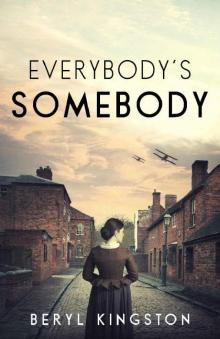 Everybody's Somebody
Everybody's Somebody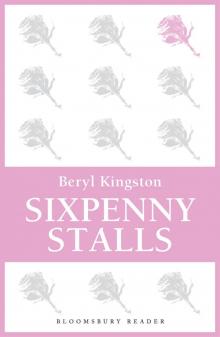 Sixpenny Stalls
Sixpenny Stalls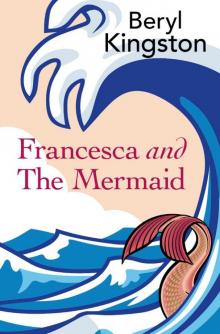 Francesca and the Mermaid
Francesca and the Mermaid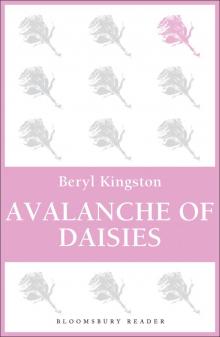 Avalanche of Daisies
Avalanche of Daisies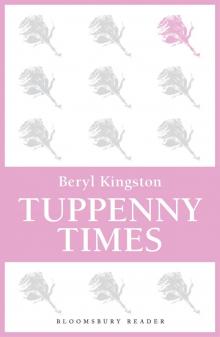 Tuppenny Times
Tuppenny Times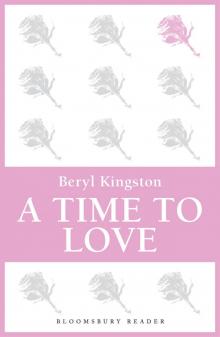 A Time to Love
A Time to Love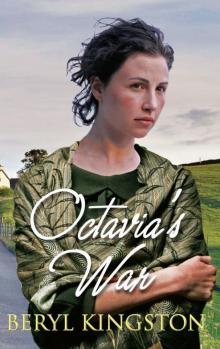 Octavia's War
Octavia's War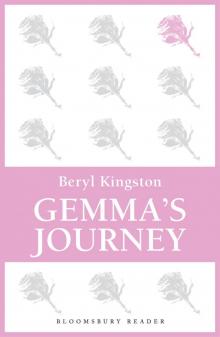 Gemma's Journey
Gemma's Journey London Pride
London Pride Gates of Paradise
Gates of Paradise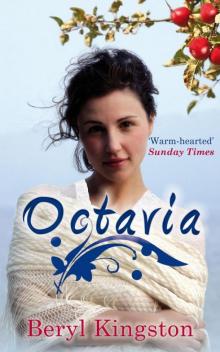 Octavia
Octavia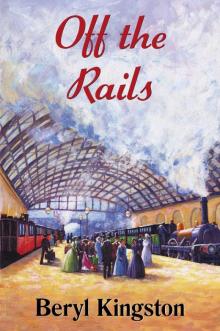 Off the Rails
Off the Rails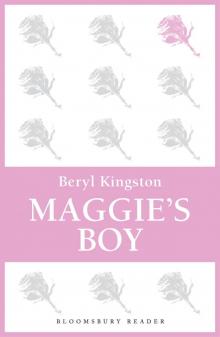 Maggie's Boy
Maggie's Boy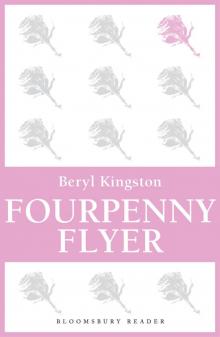 Fourpenny Flyer
Fourpenny Flyer